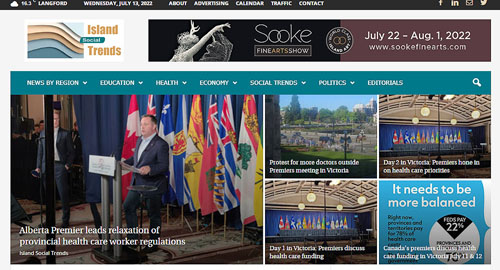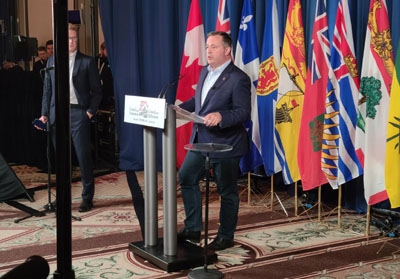
Wednesday July 13, 2022 | VICTORIA, BC
by Mary P Brooke, Editor | Island Social Trends
Somehow during the two-day Premiers meeting in Victoria this week, outgoing Alberta Premier Jason Kenney convinced the other 12 premiers to loosen up their tight grip of professional regulations for workers who want to relocate inter-provincially.
Kenney addressed media solo yesterday, a few hours ahead of all 13 provincial and territorial premiers doing a head-table press conference.
He was taking credit for Alberta’s lead in wages, salaries and benefits for health care workers (particularly doctors and nurses) over the last many years, only a day after BC Premier John Horgan (who chairs the Council of the Federation, comprised of all of Canada’s Premiers) said he was frustrated by the “poaching” of trained professionals by some provinces away from others.
Kenny’s July 12 statement said that Alberta has taken the lead “in knocking down barriers to internal trade and labour mobility”. The only problem (for the rest of Canada), until now, is that Alberta usually came out the winner by offering higher compensation. That effectively caused a few sector-specific ‘job drains’, not unlike the ‘brain drain’ of Canadian talent to the United States that has had peaks over the last five or six decades, but still continues.
Streamlining the patchwork:
Kenney explained that Canada “has a patchwork of thousands of different provincial regulations that hinder businesses and add costs for consumers across the country”. He said that efforts at regulatory harmonization at the Regulatory Reconciliation and Cooperation Table “are moving very slowly”.
He wants to see a re-examination of all those regulations in a way that will identify and revise provincial regulations across the 13 provinces and territories. He said that’s a way toward cutting costs for Canadians and growing the economy.
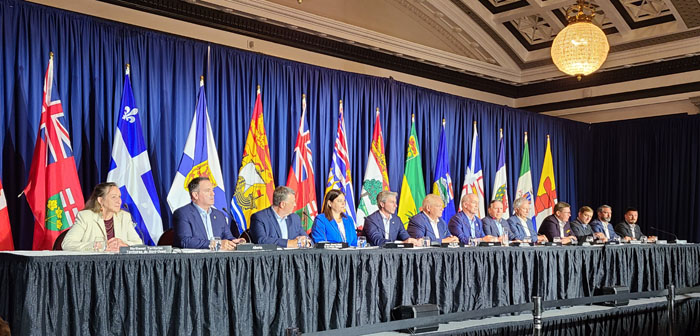
“There’s always been that concern, that anxiety” said Kenney about the idea of “poaching” health care workers from other provinces into Alberta. “And I’ll admit, Alberta has been a challenge for other provinces,” said Kenney at the noon-hour media session. He was somewhat relaxed about the acquisition of health care workers in Alberta in particular from other provinces. Health care worker relocation to Alberta is usually due to higher wages paid to doctors and nurses in Alberta.
“We have (historically) offered higher wages, salary and benefits to doctors and nurses,” Kenney articulated. But he added that after “difficult” negotiations with “nurses and other public sector unions” recently that the wages paid are “closer to the national average”.
“Currently, Canada has a patchwork of thousands of different provincial regulations that hinder businesses and add costs for consumers across the country,” it was stated by the Alberta Premier’s office in a statement today.
Horgan’s last hurrah:
On Monday, BC Premier John Horgan — who chairs Canada’s Premiers who collectively form the Council of the Federation — said that one of the problems about health care inter-provincially is that trained health care professionals can be “poached” from one province to another. Provinces that invest in training health care workers naturally are not keen to see them relocate to another province.
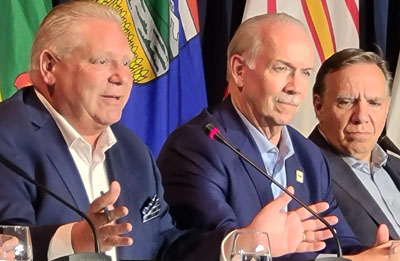
As the only NDP Premier among the 13 — and leaving his post soon (retiring from the premiership this fall due to health considerations, once the BC NDP party chooses a new leader) — Horgan now seems pressured to try and leave his mark of ‘putting people first’, before the COF falls into more conservative hands.
Horgan was clearly frustrated yesterday by what seems like a near-nothing response from the federal government so far with regard to negotiating a better Canada Health Transfer deal.
That’s other than ‘dialogue through the media’, as Horgan put it, in response to federal Minister of Intergovernmental Affairs, Infrastructure and Communities Dominic LeBlanc making a come-forward comment to the collective premiers while speaking on a CBC political talk show. And that now eight months since the political initiative from Prime Minister Justin Trudeau following his ‘handshake’ agreement with Horgan in December 2021 to for sure meet with the premiers about health care system funding. “Where’d the love go?” quipped Horgan yesterday, as to why the federal government seems to have dropped the ball on momentum to discuss health care funding.
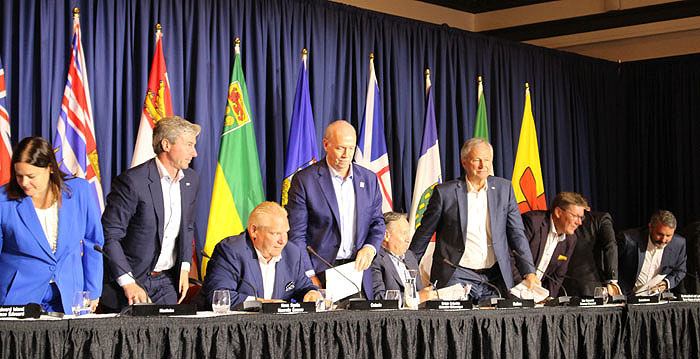
Trudeau has been saying for months (supported by federal NDP Leader Jagmeet Singh, incidentally) that health care funding would come with conditions. Perhaps the delay did make the premiers budge a bit.
What the Premiers discussed:
This week Canada’s Premiers issued a statement of priorities from their overall discussions, and for health care.
Post pandemic economic recovery priorities were listed as:
- Strengthening supply chains
- Bolstering labour supply
- Addressing climate change
- Enhancing energy security
- Food security
- Mental health and addictions
- Arctic security and sovereignty
Health care “immediate challenges” were listed (on the first day of the COF meeting on July 11, 2022) as: health human resources, long-term care, home care, mental health and substance use, pharmaceuticals, primary care, and digital and physical infrastructure.
Jason Kenney’s last stand:
Kenney has been the Alberta Premier since 2019, but is presently a ‘lame duck’ premier for Alberta, as his party (following an internal push against their leader) organizes to find another leader in the coming weeks and months.
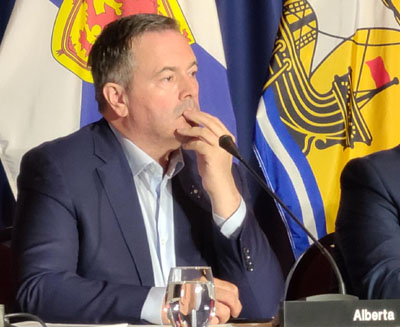
Kenney was a cabinet minister in the Stephen Harper federal Conservative government (2008-2013), and stayed on as an MP after the 2015 federal election (won by the Liberals) before reorienting to leading Alberta conservatives as the United Conservative Party in 2017.
Yesterday Kenney proudly pre-announced to ‘watch for the language’ in the July 12 Council of the Federation statement that will aim to “streamline labour mobility” among provinces. There will be recognition of credentials “specifically and especially” for health care professionals.
===== ABOUT THE WRITER:
Mary P Brooke, B.Sc., Cert PR is the Editor of Island Social Trends — a south Vancouver Island news publication based in the west shore area of the Capital Region — previously delivering news as MapleLine Magazine (2008-2010), Sooke Voice News (2011-2013), and West Shore Voice News (2014-2020).
Island Social Trends has been a daily online news portal at islandsocialtrends.ca since mid-2020, delivering ‘stuff that matters’ through a socioeconomic news lens.
Island Social Trends brings along critical-thinkers among university graduates in English, History and Philosophy as freelance journalist contributors.
Island Social Trends offers newswriting and scholarship opportunities to students graduating from high school in the west shore’s School District 62.






